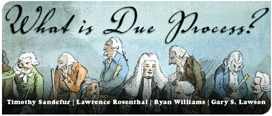I’m honored and grateful to have the chance to discuss the ideas of my article “In Defense of Substantive Due Process” with scholars like Profs. Rosenthal, Williams, and Lawson, as well as David Bernstein and Michael Rappaport at their own blogs. I can’t hope to answer all of their points, but I want in what follows to address a few of the big ones. The first relates to unenumerated rights. Prof. Bernstein, echoing many critiques of substantive due process, basically asks where judges are supposed to stop: would it be proper for a judge to say at any point “I think this law intrudes on unenumerated rights and, were I a legislator, I’d therefore oppose it, but as a judge I will defer to elected representatives”?
My answer to this is no. The point of our constitutional system is not to establish a democracy, but to limit it by imposing, among other things, the requirement that democracy act within the boundaries of law. But this is not merely a procedural requirement; to be entitled to the name “law,” a government act must comply with certain substantive values—it must be general, it must be fair, it must be public-oriented, and so forth. The Constitution deems any “democratic” action that exceeds these boundaries to be illegal, and a judge is bound to regard it as invalid. I see no basis for deference to a law that exceeds these boundaries and violates individual rights. Deference is legitimate only within the realm of legitimate action: should the age of consent be 16 or 18? Should the police station be located on this corner or on that? But there can be no legitimate action depriving people of rights—whether they be enumerated or not—and therefore it is proper for the court to invalidate such acts.
Now, you’ll note that in my opening article, I don’t really talk about unenumerated rights that much. Instead, my focus is on the requirement that government operate lawfully. Unenumerated rights are a function of that requirement, as I was again reminded when recently watching the film Gideon’s Trumpet. In one scene, Henry Fonda (playing Gideon) is asked by a fellow prisoner if he really thinks the Constitution guarantees a right to a lawyer in a criminal proceeding. He answers in unadorned words and unimpeachable logic:
“‘No state shall deprive any person of life, liberty, or property without due process of law’…. I asked them for a lawyer and they wouldn’t give me one. Means I was deprived of liberty without due process of law…. They can’t put you in jail without they give you a fair trial.”
The overlap between “procedure” and “substance” can be found in the fact that, if it’s not fundamentally fair, it isn’t really a trial at all. For a procedure to really be a trial means that it includes certain elements, and Gideon’s argument is that one of those elements is the right to a lawyer, because the contemporary trial process is so complicated that without one the whole procedure is so arbitrary that it is not really a trial at all. This is a perfectly valid argument, and one can disagree with it only by addressing the truth or falsehood of the premises—that is, by entering into the normative deliberations that the positivist seeks to avoid.
Again, I see no basis for deference on such matters. When the legislature acts within its legitimate boundaries, courts should defer, but not when it acts outside of those boundaries. This should not strike lawyers as anything new or shocking. It’s well established that courts are not entitled to refuse to exercise their jurisdiction if they have it. And it’s well established that courts do not defer when deciding their jurisdiction. So why should they defer when a law infringes on rights?
The whole notion of “deference,” I submit, is the child of a Progressive ideology that prioritizes “democracy” over liberty and individual rights. That ideology is contrary to the Constitution, which, after all, states in its very first sentence that “liberty” is a “blessing”—and limits democracy for the purpose of protecting that liberty.
Of course I don’t think judges should exceed their authority or abuse their power; just as I don’t think any official should exceed authority or abuse power. A judge who exceeds his legitimate authority is acting lawlessly, and his decisions cannot be regarded as true law, just as when a legislature exceeds its authority. But I think a robust judiciary, more willing to engage the question of legislative authority and to defend individual rights, would be healthier for American democracy than the often overly deferential judiciary that we now have. Our system was meant to balance the judiciary against the legislature, and for good reason. We do harm to that system when our judges defer to the legislature to exceed its constitutional boundaries. To do this, as Hamilton said, is to affirm that the deputy is greater than the principal, or that the legislature is superior to the people.

